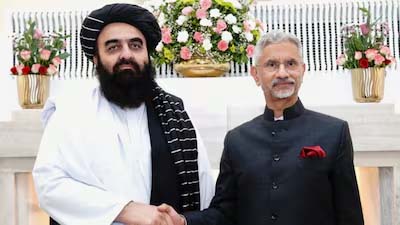
Moon Desk: Pakistan’s Ministry of Foreign Affairs has expressed serious concern over the visit of acting Afghan Foreign Minister Amir Khan Muttaqi to India. A statement issued on October 11 expressed “Pakistan’s strong reservations on the elements of the India-Afghanistan Joint Statement, issued on 10 October 2025 in New Delhi; particularly the reference to Jammu and Kashmir as part of India is in clear violation of the relevant UN Security Council resolutions and the legal status of Jammu and Kashmir. The Joint Statement is highly insensitive to the sacrifices and sentiments of the people of Indian Illegally Occupied Jammu and Kashmir in their just struggle for the right to self-determination.” The statement also “strongly rejected the Afghan Acting Foreign Minister’s assertion that terrorism is Pakistan’s internal problem.”
Indo-Afghan nexus is not a new phenomenon. But the week-long visit of Muttaqi to India led to the renewal of Indo-Afghan ties. Following the US withdrawal from Afghanistan and the assumption of power by the Taliban in August 2021, New Delhi had ceased its relations with Kabul and closed its embassy there. But, later on it reviewed its decision and without recognising the Taliban regime decided to reopen its embassy and pledged to help the Taliban regime overcome its economic predicament. Interestingly, the fresh outbreak of armed conflict between Pakistan and Afghanistan occurred when the Afghan foreign minister was in India.
How does the Indo-Afghan nexus pose a threat to Pakistan’s national security interests and why does the Taliban regime want to get closer to New Delhi? How is the two-pronged security threat to Pakistan emanating from India and Afghanistan a moment of truth for Islamabad? India was never comfortable with Afghan Taliban – whether in their first regime from 1996-2001 or the current one that started from August 2021. But in 2023, New Delhi began to change its position, realising that this time the Taliban government is here to stay.
In a write-up in Al Jazeera on October 14, Yashraj Sharma wrote, “The Afghan foreign minister’s week long trip, the first official visit by a Taliban leader, is being billed as ground breaking. India’s reset with the Taliban, experts say, is part of a policy of pragmatism, as New Delhi aims to counter Pakistani influence in Afghanistan, whose relationship with Pakistan, India’s arch foe, has been strained over cross-border attacks.” Sharma further argued, “India’s hosting of the Taliban leaders gives legitimacy and a de facto recognition to the Taliban administration, which has been struggling to boost its diplomatic legitimacy.” After meeting Muttaqi, Indian External Affairs Minister Subrahmanyam Jaishankar said, “Closer cooperation between us contributes to national development as well as regional stability and resilience.” In a joint statement issued after Muttaqi’s visit to India, “New Delhi and the Taliban committed to maintaining close communication and continue regular engagement.”





